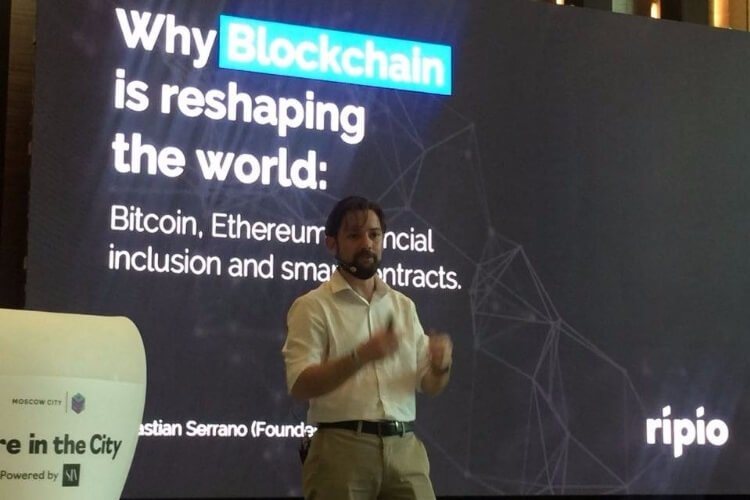Future in the City is today: blockchain and “smart city” change our lives

Yesterday in Moscow City the second annual conference “Future in the City” has been opened. Leaders of the IT industry have gathered in the "Empire" skyscraper to discuss the development of the global digital economy: Nicole Mills, the director of the department for talented specialists development in Booking.com; Stuart Rogers, the director of marketing technologies in VentureBeat; Quy Vo-Reinhard, the co-founder of HIT Foundation and the most influential woman in the blockchain industry according to Cointelegraph; Sebastian Serrano, the founder of the Argentine company Ripio; Antoine Verdon, the founder of Proxeus, Swiss developer of private blockchains.
Blockchain technologies are the most discussed topic this year, and this topic was in the spotlight from the very beginning of this conference. Sebastian Serrano, the founder of Ripio, told in his lecture "How can blockchain make financial services more accessible in emerging markets" about the blockchain development in countries with emerging economies. He devoted much time to the RCN project — a global credit protocol based on smart contracts, which allows increasing transparency and credit confidence among individuals.
According to Sebastian Serrano, the project comprises advantages of Ethereum and blockchain technology and includes a local intermediary, that neutralizes credit risks. "RCN is aimed at building innovative solutions, reducing brokerage costs and providing better conditions for both creditors and borrowers around the world," the founder of Ripio commented to Bitnewstoday.com.
Most experts have agreed that the blockchain technology is a real breakthrough, which can provide access to crypto operations, reduce the corruption level and ensure information security.
Smart city technologies have also been widely discussed. “Currently, the technology scope is not so wide. In general, it is used in public communications and travelings around the metropolis. For example, it is much easier and cheaper to use a taxi nowadays. The same is about urban transport in large cities, which is now being transferred to the blockchain," says Ilya Drozdov (ex-Uber).
The topic of “the smart city” is highly discussed in international forums, which is not surprising: more elements of the urban environment communicate with a person in their particular "digital" language. The modern city strives for modularity and network forms of organization.
Bitnewstoday.com will continue covering the agenda of the forum in our upcoming publications.
Photo: Sebastian Serrano speaks about the development of financial markets with the help of blockchain
Translated by Diana Asadova